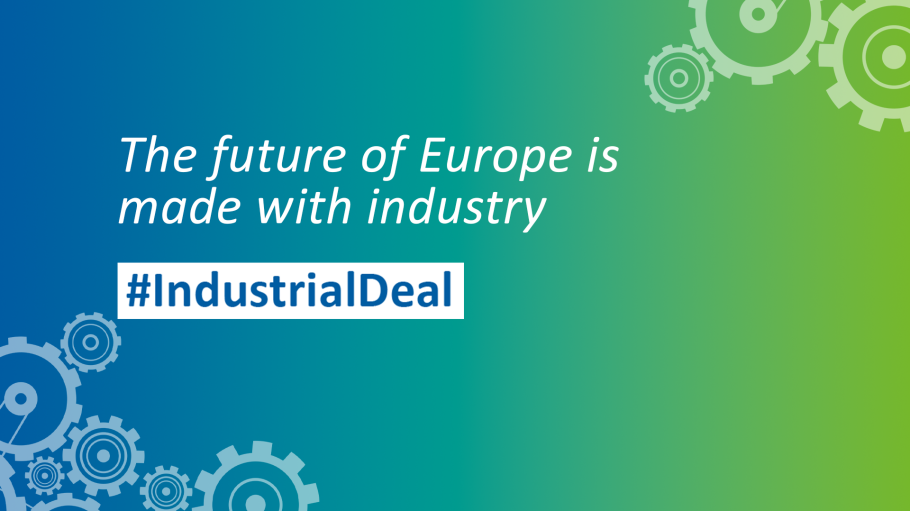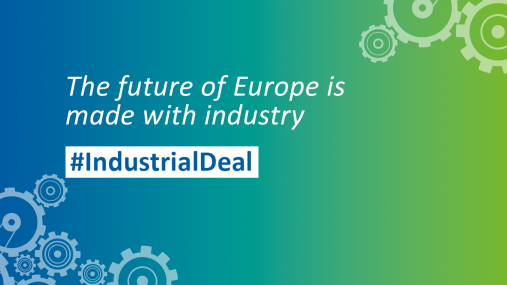
Publications » Position papers » The Antwerp Declaration for a European Industrial Deal
The Antwerp Declaration for a European Industrial Deal
Downloads and links
Recent updates

The undersigned companies and organisations (1) express their full support for a European Industrial Deal to complement the Green Deal and keep high quality jobs for European workers in Europe. As very clearly stated by the Belgian PM Alexander De Croo: “We need our industry for their innovation capacity. To come up with tomorrow’s climate solutions. That is why Europe should not only be a continent of industrial innovation, but should remain a continent of industrial production” (2).
To meet climate neutrality by 2050 and the recently communicated 2040 target, Europe’s electricity production will need to multiply, and industry investments will need to be a factor six higher than the previous decade. This enormous challenge comes just as both large companies and SMEs face the most severe economic downturn in a decade, demand is falling, production costs increase and investments move to other regions. A US economy that benefits from the financial support from the Inflation Reduction Act (IRA) and its ease of accessibility, a Chinese overcapacity and increasing exports to Europe all increase the pressure for the European industry even more. Our companies face this challenge every day. Sites are being closed, production halted, people let go. Europe needs a business case, urgently.
An Open Strategic Autonomy for a competitive and resilient EU is crucial for the transition of Europe in an ever changing geopolitical landscape. It can however only be achieved if also basic and energy intensive industries remain and invest in Europe. Without a targeted industrial policy, Europe risks becoming dependent even on basic goods and chemicals. Europe cannot afford this to happen.
Our Declaration calls to Member State Governments, the next European Commission and Parliament to:
1. Put the Industrial Deal at the core of the new European Strategic Agenda for 2024-2029. We call for a comprehensive action plan to elevate competitiveness as strategic priority and create the conditions for a stronger business case in Europe. The action plan needs to include actions to eliminate regulatory incoherence, conflicting objectives, unnecessary complexity in legislation and over reporting. We ask to develop an Omnibus proposal to take corrective measures on all relevant existing EU regulations as the first piece of legislation to be presented in the next EU institutional cycle.
2. Include a strong public funding chapter with a Clean Tech Deployment Fund for Energy Intensive Industries closely coordinated with a simplified State Aid framework, while respecting the Single Market rules. This should allow public de-risking of private investment into clean technologies through both CAPEX and OPEX support, with guarantees to ensure the retention and creation of quality jobs in Europe, and propose a competitive and sustainable tax level across Europe.
3. Make Europe a globally competitive provider of energy. The costs of energy in Europe are simply too high to compete and are not only driven by commodity prices but also by regulatory charges. The next European Commission needs to prioritise new projects for abundant and affordable low carbon renewable and nuclear energy. We need a real EU Energy Strategy with concrete actions that enable cross-border electrical power, grid expansion for hydrogen and other renewable & low-carbon molecules, and partnerships with resource-rich countries.
4. Focus on the infrastructure Europe needs. Target the Recovery and Resilience Facility and Structural and Regional Funds to integrate and build a worldclass EU Energy, digital, CCUS and recycling infrastructures as soon as possible, make these Important Projects of Common European Interest. Debottleneck cross border transport and develop trans-European networks. Remove permitting obstacles for industrial transformation projects. This transformation will also require significant numbers of skilled workers that are currently in short supply. Targeted programmes will be necessary to make these available quickly.
5. Increase the EU’s raw materials security through scaling up domestic mining, sustainable processing and recycling capacity for crucial raw materials, combined with new global partnerships. Scale up renewable carbon and circular carbon feedstocks, including the expansion and fast-permitting of advanced chemical recycling technologies. Develop a Circular Carbon Strategy that incentivises Carbon Capture and Use (CCU), biobased feedstocks, base metals, minerals and advanced materials necessary to reach the aims of the Green Deal. Free trade agreements or other types of agreements should secure vital supplies for industry, enable access to new markets and increase exports. The EU should look at all policy instruments against unfair competition to ensure a real level playing field for EU industries both on the domestic and international markets, including carbon leakage protection.
6. Boost demand for net zero, low carbon and circular products. Empower consumers (businesses and private) to choose net-zero and circular products, based on transparent product and environmental carbon footprints. Lead the way through public procurement and private buyer initiatives endorsed by the EU. Expand the scope of the Net Zero Industry Act and the Critical Raw Materials Act. Grow sales potentials by improved market access in international markets.
7. Leverage, enforce, revive and improve the Single Market for the transition of integrated value chains, including measures to address increased fragmentation caused by national implementation of European legislation. Create a single market for waste and recycled materials and also a true European energy market. Improve enforcement of existing measures focusing on imports.
8. Make the innovation framework smarter, including fostering high-quality science, technological innovation, and collaborative policies that prioritise openness and pragmatic outcomes while embracing innovative approaches like regulatory sandboxes. Promote digitalization as a prerequisite for groundbreaking research and to enhance efficiency. Protect IP rights to bring a competitive advantage to Europe. Focus on the transfer from demonstration to innovation and first of a kind commercial technologies.
9. A new spirit of law-making. Let entrepreneurship thrive to find the best solutions to overcome challenges. Legislation should create incentives for businesses to invest in clean technologies. Avoid that the Green Deal policy targets are followed by prescriptive and detailed implementing regulations. Prevent over reporting, ensure coherence, stay tuned with industrial reality and integrate legislative proposals through a stronger Secretariat General and Regulatory Scrutiny Board which systematically applies a Competitiveness Check and a European Innovation Stress Test against which each new legislation and policy initiative should be evaluated. Use robust data and scientific evidence for effective policymaking. Assess the cumulative impact of legislation.
10. Ensure the structure allows to achieve results. Install a First Vice-President responsible for the delivery of the European Industrial Deal and for ensuring the seamless integration of legislation and alignment with the agenda of the next European Commission, overseeing the key DG’s for the Industrial Deal in one integrated approach.
In the 2023 State of the Union Address, President von der Leyen already said “As we enter the next phase of the European Green Deal, one thing will never change…..We will keep supporting European Industry throughout this transition.” This needs to be a European approach, instead of twenty-seven different national incentives, by keeping and strengthening the integrity of the internal market while keeping global competition better into account.
We need to keep industry in Europe because the industry will deliver the climate solutions Europe needs. Solutions that citizens and governments can use, but that can only be invented and implemented with speed and scale by the industry, and the support from governments. Only with a strong industrial fabric and strengthened social dialogue in Europe can we ensure that the green transition will be a Just Transition, as agreed in the Val Duchesse tripartite declaration. A competitive European industry, based on a European Industrial Deal, is the “conditio sine qua non” for the successful delivery of the EU Green Deal. It is also the only way to show to the rest of the world that the Green Deal works for all.
Companies and organisations are invited to support Europe’s basic industries by co-signing the declaration at www.Antwerp-Declaration.eu.
First signatories
73 European industry leaders spanning almost 20 industrial sectors, including the steel sector.
Companies
1. Jean-Marc Meunier, AGC Glass Europe
2. Pascal Juery, Agfa-Gevaert
3. Petr Cingr, AGROFERT
4. François Jackow, Air Liquide
5. Guillaume de Goÿs, Aluminium Dunkerque
6. Geert Van Poelvoorde, ArcelorMittal Europe SA
7. Inge Hofkens, Aurubis AG
8. Martin Brudermüller, BASF
9. Bill Anderson, Bayer AG
10. Mikael Staffas, Boliden AB
11. João de Mello, Bondalti
12. Ilse Kenis, Carmeuse
13. Marcel van Amerongen, Celanese
14. Jose María Solana, Cepsa Química, S.A.
15. Stefan Vuza, Chimcomplex SA
16. Conrad Keijzer, Clariant International Ltd
17. Markus Steilemann, Covestro AG
18. Yves Bonte, DOMO Chemicals
19. Neil Carr, Dow Europe GmbH
20. Pierrick Le Gallo, DuPont
21. Erwin Dijkman, Eastman
22. Harald Schwager, Evonik Industries AG
23. Philippe Ducom, ExxonMobil Petroleum & Chemical BV
24. Emmanuel Amory, GlaxoSmithKline Biologicals
25. Jon Morrish, Heidelberg Materials AG
26. Paul De Bruycker, Indaver
27. Jim Ratcliffe, INEOS
28. Antti Salminen, Kemira
29. Mattias Zachert, LANXESS AG
30. Jan Moström, LKAB
31. Peter Vanacker, LyondellBasell
32. Marcelo Franco de Sousa, Matceramica
33. Ilkka Hämälä, Metsä Group
34. Frederic Gauchet, Minafin Group
35. Gabriel Szabó, MOL Plc
36. Matti Lehmus, Neste Corporation
37. Johan Landfors, Nouryon AB
38. Guido Janssen, Nyrstar
39. Daniela Vlad, OMV AG and Borealis AG
40. Ib Jensen, Perstorp Group
41. Wim Michiels, Proviron
42. Juan Abascal, Repsol
43. Mark L. Williams, SABIC
44. Paul Hudson, Sanofi
45. Marco Eikelenboom, Sappi Europe
46. Pierre Luzeau, SEQENS
47. Marco Richrath, Shell plc.
48. Michèle Sioen, Sioen Industries NV
49. Philippe Kehren, SOLVAY
50. Ilham Kadri, Syensqo
51. Mark Newman, The Chemours Company
52. Roeland Baan, Topsoe
53. Patrick Pouyanné, TotalEnergies
54. Adriano Alfani, Versalis (Eni)
55. Pierre Macharis, VPK Group
56. Heimo Scheuch, Wienerberger AG
57. Svein Tore Holsether, Yara International ASA
Industry Associations
1. Marco Mensink, Cefic
2. Koen Coppenholle, CEMBUREAU
3. Jori Ringman, Cepi
4. Renaud Batier, Cerame-Unie
5. Philippe Cornille, EIGA
6. Yves Verschueren, essenscia
7. Rodolphe Nicolle, EuLA -The European Lime Association
8. Dirk Vantyghem, Euratex
9. Axel Eggert, Eurofer
10. Guy Thiran, Eurometaux
11. Rolf Kuby, Euromines
12. Paul Voss, European Aluminium
13. Antoine Hoxha, Fertilizers Europe
14. Liana Gouta, FuelsEurope/Concawe
15. Bertrand Cazes, Glass Alliance Europe
Organisations
1. Michael Vassiliadis, industriAll European Trade Union
(1) Industries in the EII ecosystem which employs 7.8 million people in Europe and provides a value added of EUR 549bn (4.55% of the EU total). Source: European Commission, DG Grow, Fiche EIIs, July 2022
(2) Speech Alexander De Croo - UNGA78, New York, 20 September 2023

Download this publication or visit associated links
Industrial Accelerator Act launches lead markets - but more is needed to support green steel “Made in Europe”
Brussels, 26 February 2026 — Europe’s steel industry has warned that the current draft Industrial Accelerator Act could direct public support for low-carbon steel to producers outside the European Union, unless lawmakers include and tighten ‘Made in Europe’ provisions.
Brussels, 24 February 2026 - Europe’s energy-intensive industries have set out a series of proposals to ensure that the EU’s upcoming Electrification Action Plan delivers on its objectives to stimulate and boost electricity consumption in industry. In a joint position paper, industries warn that persistently high electricity prices risk undermining industrial competitiveness and decarbonisation efforts. They call for a policy framework that will enable EU industry in pursuing decarbonisation and industrial competitiveness.